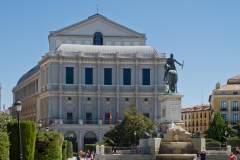La Vida Breve / Tejas Verdes
Mo | Tu | We | Th | Fr | Sa | Su |
The premiere of the new opera Tejas Verdes is a great Spanish musical event. Created entirely by homegrown talent, it was inspired by the poems of Miguel Hernández's Cancionero y romancero de ausencias. The stage director Rafael R. Villalobos links the score by Jesús Torres and the work of Manuel de Falla with his scenery and characterisation.
LA VIDA BREVE
Lyric drama in two acts
Music by Manuel de Falla (1876-1946)
Libretto by Carlos Fernández Shaw
Premiered in French at the Casino Municipal de Niza on 1 April 1913
Premiered in Spanish at the Teatro de la Zarzuela in Madrid on 14 November 1914
Premiered at the Teatro Real on 11 October 1997
Synopsis
Time: 20th century
Place: Granada
Act 1
Afternoon and sunset in the (gypsy) Albaicín district
A male chorus of anvil workers plies their trade at the local forge. The young gypsy, Salud, is passionately in love with a young well-to-do man named Paco. She does not know, and Paco does not tell her, that he is already engaged to a woman of his social class. Her uncle, Sarvaor (Salvador), and her grandmother (La abuela) have discovered this, and they try to prevent Salud from interrupting Paco's wedding after she learns the truth.
Act 2
A wealthier part of the city: in front of a house on whose patio wedding festivities are in progress (and visible from the street), and then in the patio itself
Confrontation (which from several perspectives is the theme of the whole opera) occurs after Salud and Sarvaor gate-crash the festivities, astonishing the bride and the guests and momentarily throwing the mendacious groom so much off his guard that he utters Salud's name before denying he knows her and ordering her ejection. Her heart broken, Salud falls dead at his feet, in what is said to be the ultimate gesture of contempt for a former lover.
TEJAS VERDES
Music by Jesús Torres (1965)
Libretto by Fermín Cabal, based on his play of the same name with interspersed poems from the Cancionero y romancero de ausencias by Miguel Hernández.
World premiere
New Teatro Real produccion
Program and cast
Artistic team
Musical conductor: Jordi Francés
Stage direction and costumes: Rafael R. Villalobos
Set design: Emanuele Sinisi
Lighting: Felipe Ramos
Choreography: Estévez / Paños Compañía
Plastic consultant: Soledad Sevilla
Cast
LA VIDA BREVE
Salud: Adriana González
Paco: Eduardo Aladrén
La abuela: Ana Ibarra
El tío Sarvaor: Rubén Amoretti
Carmela / Vendedora: Carmen Mateo
Manuel: Gerardo Bullón
La voz en la fragua: Alejandro del Cerro
TEJAS VERDES
Colorina: Natalia Labourdette
Hermana: Maria Miró
Madre: Sandra Ferrández
Delatora: Alicia Amo
Doctora: Ana Ibarra
Enterradora: Laura Vila
Chorus and Orchestra of the Teatro Real
Teatro Real
The Teatro Real is Spain's leading opera house. It is considered to be the top institution in the country in the music and performing arts field.
The Teatro Real Foundation is chaired by the King and Queen of Spain. It relies on two public administrations that took part in its creation: the Ministry of Education, Culture and Sports, and the Comunidad de Madrid (Regional Government of Madrid). The Foundation is governed by a Board of 31 trustees. The Board of Trustees elects the President of Board and the Executive Commission as proposed by the Ministry of Education, Culture and Sport. The Foundation is a public entity and there is an important role played by civil society in its governance and sponsorship.
The objective of the Teatro Real is to create a venue for the most talented singers, conductors ands stage directors from around the world. Its artistic mission is expressed in programming which seeks excellence by combining classical and contemporary lyrical repertory to appeal to audiences of all ages and interests. Introducing young people and children to opera is of particular concern. All this, along with the Principal Chorus and Orchestra of the Teatro Real, the most up to date technological expertise and the large number of in house productions on stages around the world has firmly positioned the Teatro Real in Spain and abroad.

 EN
EN DE
DE IT
IT FR
FR ES
ES RU
RU JP
JP RO
RO
 Seating plan
Seating plan 